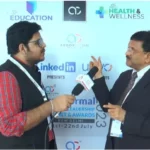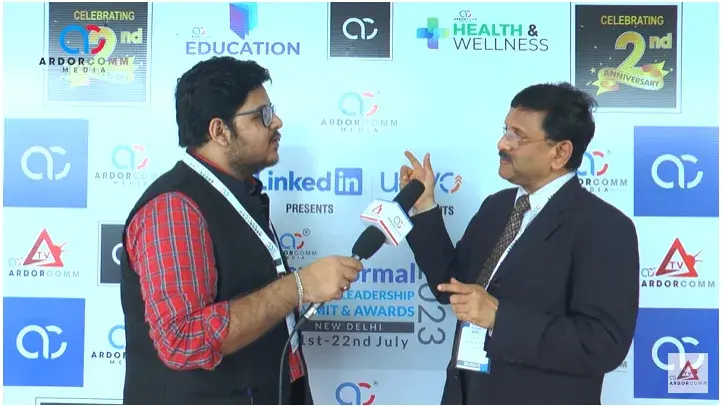ArdorComm Media Bureau
August 12, 2023
“The academic institutions can, for once, become financially viable if they can adapt and deliver quality education, link experiential learning to not just employability, but research innovation, product process, to enable local MSMEs to startups,” says Prof. (Dr.) B.S. Satyanarayana, Vice Chancellor of G.D. Goenka University, Sohna in an Interview with Pratik Ghosh, Content Writer, ArdorComm Media Group at the ‘New Normal – Education Leadership Summit & Awards 2023’ #ELSANewDelhi #ELSAGurugram
How are you feeling to witness the New Normal Education Leadership Summit and Awards in Delhi?
I think it’s been a wonderful experience so far. First of all, I’d like to congratulate ArdorComm for their second anniversary and also that we could be here. I am also moderating a panel and will also be speaking in one more. I think the whole country is transforming and India took 75 years to reach about 3.5 trillion. In the next seven years, we are going to be 7 trillion or 7.5, and that’s where this new normal of adapting technology, adapting dynamically changing with experiential learning, leveraging NEP becomes very critical. So, it’s wonderful to see that we have industry leaders coming and showcasing their products here, we have academics discussing what they are doing, their case studies, best case studies. I think we all need to seriously work together to be sure that we will be able to achieve, because the last 75 years of our education was literally rote education. It was by learning and repeating. But we don’t have any more time, nor do we have the learning time to generically grow. We not only need to maybe leapfrog but truly pole vault to deliver, as I said, a 3.5 trillion economy in spite of the education because education was irrelevant. But in the next seven years, if we have to become that 7.5 in this knowledge-driven era, skill-required era, the knowledge and the skill have to be seamlessly linked with experiential learning, leveraging technology. Both the teacher and the taught have to learn very fast, adapt. Without technology, it will not happen, but at the same time, it’s a huge lever. So, I think it’s an excellent platform for all of us to come together, discuss here about this new normal and truly say that education has always been about technology and learning. Linking the two, but then now we have to do it at a very great dynamic pace, adapt and change. Because I think the latest studies clearly show even the learning cycle or the knowledge life cycle is getting as short as three years or 36 months. Products are becoming three months. So, if we are seriously not adapting to this thought process, getting on board, working collaboratively, because nowhere can we do it on our own, I think we will be literally doomed. But it’s a unique opportunity for all of us to move forward and enable the students. The academic institutions can, for once, become financially viable if they can adapt and deliver quality education, link experiential learning to not just employability, but research innovation, product process, to enable local MSMEs to startups. And therefore, the whole ecosystem then grows with pilot production to scale the production and going global. And when the whole world is looking at India and the global value chain as a key player, I think it’s an exceptional opportunity. So, very happy that we have this opportunity to come and discuss, also learn from experts.
Is your university taking some initiatives to help the students who are planning to be startup founders or entrepreneurs?
Absolutely. See, to first of all bring in that mindset of multi-disciplinary experiential learning, we offer the first course we offer as a value-added course to any program, whether it’s BBA, English, Engineering, Management, Economics, Agriculture, Law, Allied Health Science, Physiotherapy, Nursing, whatever. We offer a course in design thinking in the very first semester, and in the next semester, we have a course on innovation, entrepreneurship, and sustainability. Because we think entrepreneurship, sustainability, innovation, all have to go together. Because I have to choose sustainable material. I have to look at the sustainability of ROI. Look at the sustainability of human resource, skill-based training. All of them have to come in. So, we keep it as an integrated process and they do a project-based activity in the very first year of their education. And they even get a skill certification as per NEP on digital multimedia communication as a part. So that if you even leave, you would have actually carried out an entrepreneurial pursuit. That tomorrow when you go to a company, you can be a manager from day one and be entrepreneurial in your job. So, I think what you said is very true, because that is where the opportunity is. We cannot depend on multinationals. Even if they put up a company and scale it up, they can. We want the student to set up a local startup, build the ecosystem, and a local startup can grow up with more ecosystem and pilot production to scale up global product process solution with quality. That is where employment will happen, the whole value chain, the growth of the ecosystem will happen. So, all the best-developed countries, whether you look at Scandinavian countries, Israel, Ireland, South Korea, Taiwan, the local universities work with startups, they scale up, and then the multinationals acquire, and the whole ecosystem grows. Everybody’s win-win growth. So, if we are as far as we simply blindly import multinational and they set it up, it will only be lesser jobs. So, I think the NEP gives this platform. That’s going to be the new normal, and we are quite excited about being a part of this and trying to see how do we proactively create solutions which could be a role model for even others in an economical way. They don’t have to go overboard with investment. They can move forward is how we are looking at it.
Any good wishes or messages for ArdorComm Media Group on its 2nd anniversary?
I think we want more such activities and let the ArdorComm Media grow. Let us all grow together, learn from these processes, learn from each other. And let it be a win-win collaboration. Thank you very much.


